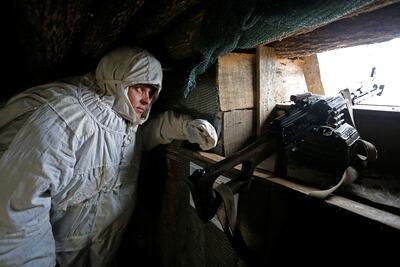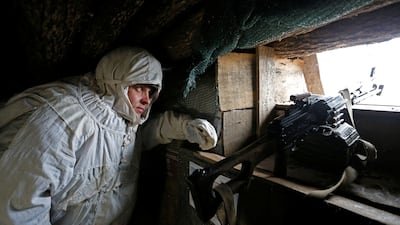Deteriorating security situations around the world are not irredeemable but present a shifting challenge for policymakers.
London's Chatham House convened a panel of experts to unlock how some of the globe's most acute conflicts might be resolved.
Members of the Royal Institute of International Affairs on Thursday analysed the International Crisis Group's annual list of the 10 conflicts to watch.
The meeting is a chance for some of the most experienced voices in diplomacy and statecraft to give their perspectives on current events.
Richard Atwood, of the International Crisis Group, said that since 2014 violent conflict had declined but in many countries suffering had not abated.
For the rest of the year ahead, he said that the goal should be to examine the human cost of fighting.
“We highlighted this year Islamic militancy in Africa, the fact that really Africa has become, in some ways, the centre of gravity for fights against ISIS and Al Qaeda-linked groups, so sometimes, like that, we identify a trend that we think is interesting and that people should be paying attention to,” he said.
He said the single biggest potential humanitarian disaster on the horizon lies in Afghanistan.
“The Taliban themselves clearly have done very little to make decision-making in western capitals easier but I don't think we can overlook the lion's share of responsibility for the policies and for the humanitarian situation,” he said.
“There is humanitarian aid going in. The UN has just put out its enormous appeal — I think is one of the biggest ever — certainly the biggest appeal this coming year for humanitarian and economic support.
“There is some humanitarian aid going in, but it's not enough.
“I think we're really very worried by the months ahead in Afghanistan, unless there's a much faster change of policy than appears on the cards at the moment.”
Meanwhile, in Ukraine, Mr Atwood said there are few obviously good solutions in the negotiations being led by US and Russia.
“President [Vladimir] Putin has made his demands fairly clear — he wants two things. One is the implementation. as Russia understands it, of the Minsk agreements in Ukraine, which as Russia understands it means a much greater degree of autonomy to separatist-held areas, which would effectively give … Russia a veto over Ukrainian foreign security policy,” he said.
“He wants an end to any military relationship or involvement of Nato member states in Ukraine, training of the Ukrainian army or the deployment of advisers.
“That's the first thing. and then the second thing [is] he wants to these guarantees on Nato — this is what he's put forward in the draft treaty that they presented to the US — hard guarantees that Nato is not going to expand any further, not to include Ukraine and Georgia in particular.”

The following are the 10 conflicts to watch in the coming year, according to the International Crisis Group.
1. Russia-Ukraine
“Russia may intend for the build-up to force concessions,” the International Crisis Group report said.
“But given [Russian President Vladimir] Putin’s track record and underestimation of the hostility Moscow inspires among Ukrainians outside separatist-held areas, no one should rule out another military adventure.
“If Russia plans to fight, its options vary from limited support of separatists to a full-scale assault.”
2 Ethiopia
“A counteroffensive by federal troops and allied militia forced Tigray forces to withdraw back to their home region,” the report stated.
“But if federal forces, for now, are ascendant, both sides command strong support and could drum up more recruits. Neither is likely to deliver a mortal blow.”
3. Afghanistan
“[US President Joe] Biden should release Afghanistan’s frozen assets, with an initial tranche to test the waters,” the International Crisis Group recommended.
“If the White House, loath to underwrite Taliban rule, won’t take that step, internationally supervised currency swaps could infuse dollars into the economy.
“Propping up health care, the education system, food provision, and other basic services should be priorities — even if this requires western policymakers to work through Taliban ministries.
“The alternative is to let Afghans die, including millions of children. Of all the blunders the West has made in Afghanistan, this one would leave the ugliest stain.”
4. US-China
“A virtual meeting in November between Biden and Chinese President Xi Jinping took some of the edge off the frosty rhetoric of previous months,” the report said.
“It could yield more working-level engagement, including the resumption of defence dialogues.
“In 2022, with the Beijing Winter Olympics, the 20th [Chinese Communist] Party Congress and US midterm congressional elections, both sides likely want quiet fronts abroad, even if they rattle sabres for audiences at home.
“The nightmare scenario — a Chinese attempt to seize Taiwan, potentially forcing the United States to come to Taipei’s defence — is unlikely for now.”
5. Iran
“For Washington, accepting Iran as a threshold nuclear state — one able to build a bomb even if not yet having done so — will likely prove to be too bitter a pill to swallow,” the International Crisis Group stated.
“The alternative would be to approve or join Israeli strikes aimed at setting back Tehran’s nuclear capability.
“If that happened, Iran’s leaders — whose calculations are likely informed by the toppling of former Libyan leader Muammar Al Qaddafi, who forfeited his nuclear weapons programme, and the respect [former US president Donald] Trump showed towards nuclear-armed North Korea — may well sprint towards weaponisation.”
6. Yemen

“Yemen’s war is a multiparty conflict, not a binary power struggle; any hope of reaching a genuine settlement requires more seats at the table,” the report said.
7. Israel/Palestine
“For anyone still eager to renew negotiations, the last year was cause for despair,” the report continued.
“The centre of gravity in Israeli politics has long since shifted away from peace, as successive governments have abandoned talks in all but name.
“Most Palestinians have lost faith they will win statehood through negotiations.”
8. Haiti
“Many Haitians bristle at the idea of a new UN peacekeeping mission, let alone US military intervention, but without some overseas help, it is hard to see Haiti escaping its predicament,” the report said.
“Donors supporting a specialised joint Haitian-UN office tasked with prosecuting top officials, police and judges accused of serious crimes could help reduce violence and sever ties between criminals and politicians.”
9. Myanmar
“Having locked up their rivals — Aung San Suu Kyi has already been sentenced to two years’ imprisonment and could end up locked up for life — [Myanmar's] generals are moving to amend electoral rules in their favour and hold a vote in 2023,” the International Crisis Group said.
“However, any poll that would usher in a military-backed government would be seen as a farce.”
10. Africa
“Islamist militancy on the continent is nothing new, but revolts linked to [ISIS] and Al Qaeda have surged in recent years,” the report continued.
“Weak states struggle against nimble militant factions across vast hinterlands where central governments hold little sway.”


